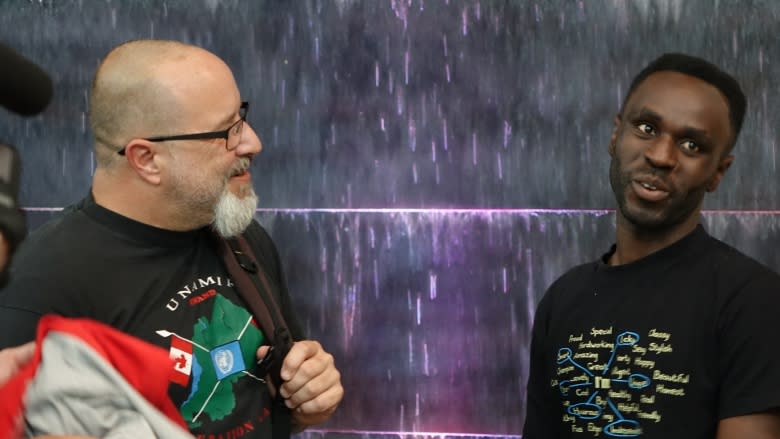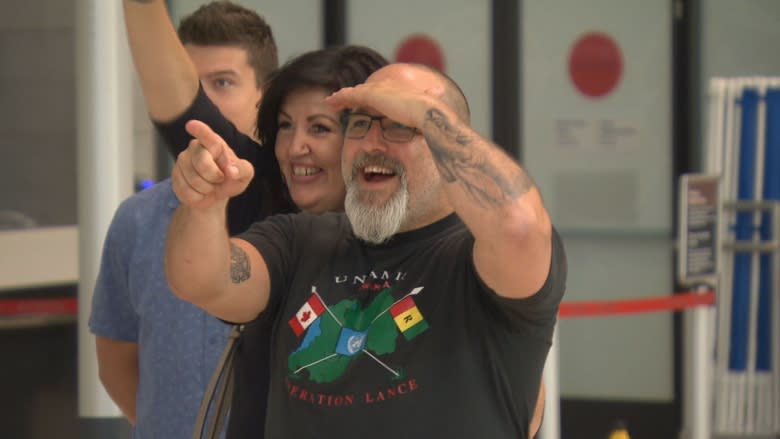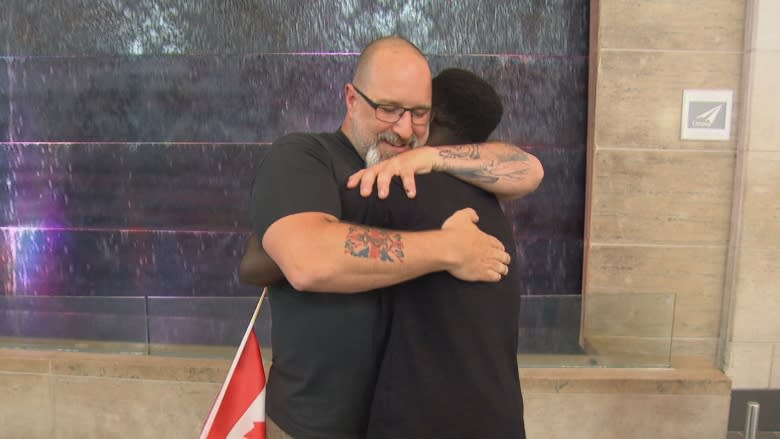Canadian vet, Rwandan genocide survivor reunited after 23 years
It was an emotional and long-awaited reunion Sunday at the Ottawa International Airport.
Sammy Sampson, a former Canadian soldier who served in Rwanda, and Sammy Tuyishime, a 28-year-old genocide survivor, met yesterday for the first time in 23 years.
Sampson was deployed in Rwanda in 1994 when he met Tuyishime, then only four years old, and helped get him into an orphanage.
The two quickly formed a bond, and the boy — whose name at the time was unknown— was renamed "Sammy" after the soldier he so admired.
But when Canada's mission in Rwanda ended in 1995, Sampson was forced to leave him behind.
For more than two decades, Sampson feared the worst. Violence had flared up again after their departure, and he didn't know what had happened to the orphanage or its inhabitants.
Then, early this year, the two finally reconnected over social media, and made plans to meet in person.
That day finally came this weekend, and it was an emotional one for Sampson, his girlfriend Susie Kingsley said.
The former soldier still experiences symptoms of PTSD and declined to speak with CBC at the airport, but spoke with CBC's All In A Day Monday.
He said finding out what happened to Tuyishime has weighed on him, but he needed that resolution to help him work through the post-traumatic stress.
"It was something that was sitting in the back of my mind that I certainly had to do," he said.
Sampson said bringing Tuyishime to Canada also helps some of the other soldiers who were on the Rwandan mission.
In 1994, Tuyishime spoke no English — instead, he would tilt his head and point at Sampson, a gesture the soldier started mirroring.
Yesterday, when Tuyishime finally appeared on the escalator at the arrivals gate, Sampson looked up from where he was waiting, shouted an exuberant "Hey!" and pointed.
Deployment to Rwanda
In 1994, Sampson was stationed in Gisenyi, a small city on the north shore of Lake Kivu. There, he grappled with the horrific aftermath of the 100-day genocide that left 800,000 people dead.
Many of those who survived were children like Tuyishime — newly orphaned and alone.
Tuyisheme introduced himself to Sampson by wrapping his small arms around his leg and refusing to let go.
Sampson brought Tuyishime to a local orphanage called Imbabazi. Canadian soldiers continued to visit, often bringing supplies, and the bond between the two strengthened.
The orphanage later told Sampson that they had named the boy "Sammy" after him.
Sampson initially feared the orphanage had been overrun by paramilitary groups after Canadian soldiers left the country.
But decades later, he received good news: Kingsley had been looking into what had become of the orphanage, and not only had it evaded the violence, but it had thrived.
'A degree of helplessness'
In early 2018, Sampson and Tuyishime reconnected during a Skype call. It was the first time they had seen each other since 1995.
Shortly afterward, Kingsley said, Sampson started a fundraising campaign to bring Tuyishime to Canada for a visit.
The campaign was a runaway success, she said, with many people — including fellow veterans — donating a total of around $10,500.
Retired brigadier general Paul Rutherford, who served in Rwanda with Sampson, came with him to the airport Sunday to offer him support.
Rutherford said many soldiers struggled with complicated emotions during their time there.
"A lot of us feel a degree of helplessness, that we didn't manage to do a lot more," he said. "But what Sammy did there, what a lot of people did, is just connect with the orphans and try to provide the best help that they could."
For his part, Tuyishime said he's overjoyed to be in Canada with Sampson and the people he considers family.
"I'm so proud of him," he said. "To reconnect with him ... it is amazing."




